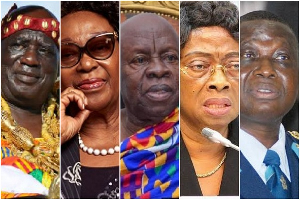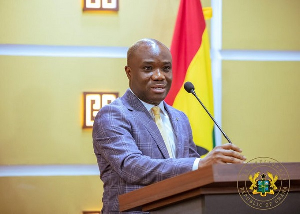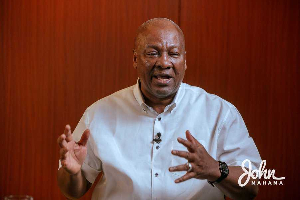Four weeks ago, a developing constitutional impasse began in Ghana over the passage of the anti-LGBT+ Bill. The bill was unanimously approved by parliament on Wednesday, February 28, 2024 (see “NPP and NDC join hands in Parliament to unanimously pass the anti-LGBT+ Bill," GhanaWeb, February 28, 2024). Since then, developments regarding the bill’s assent appear to be shrouded in constitutional confusion that could threaten the separation of powers, judicial independence, and non-interference in parliamentary democracy and the rule of law.
This article is an analysis of the impending constitutional confusion that could damage Ghana’s Fourth Republic, which thus far has worked well. Let me point out that this article is neither academic nor legal, and therefore, I will avoid lengthy theoretical analyses of constitutional concepts, principles, and doctrines as well as legal authorities.
For this reason, I will not be citing case laws except references to a few relevant Articles of the 1992 Constitution, where appropriate. It will be useful to provide the chronology of events to enable readers to understand the discourse. Following the unanimous approval of the LGBTQ+ Bill, there were reports that the president might not assent to the bill because of threats from Western donor countries withdrawing support for Ghana. Hairs were raised when two academists and human rights activists, Prof Audrey Gadzekpo and Prof Takyiwa Manuh, criticised the passage of the bill (see. “Prof Gadzekpo, Prof Manuh, Others are being funded to advocate against the anti-LGBT+ bill, Sam George alleges” (GhanaWeb, February 29, 2024).
The US Ambassador to Ghana, Her Excellency, Virginia Palmer, also chipped in to say that if the bill becomes law, it will hurt Ghana (see, "If the LGBT+ bill is passed into law, it will hurt Ghana’s economy—US Ambassador to Ghana insists," GhanaWeb, February 29, 2024). The UN High Commissioner for Human Rights, Volker Turk, also added his voice by calling for the bill not to become law (see, “Consensual same-sex conduct should never be criminalized: UN Human Rights chief on anti-LGBT+ Bill," Ghanaweb, February 29, 2024).
Then, the President, Nana Akufo-Addo, issued a statement assuring Ghana’s Western partners that Ghana will not slide back on her human rights records and that the bill has yet to reach his desk. The President added, “I have learned today that a challenge has been mounted at the Supreme Court by a concerned citizen to the constitutionality of the proposed legislation” (see, “Anti-LGBT+ Bill: Ghana will not backslide on human rights record—Akufo-Addo assures," GhanaWeb, March 4, 2024). The Ministry of Finance also cautioned the president from assenting to the bill in haste because Ghana could lose financial support from the IMF, World Bank, and other Western donor countries to the tune of $3.8 billion over three years (see, “Refrain from signing the Anti-LGBT+ Bill into law: Ministry of Finance warns Akufo-Addo," GhanaWeb, March 4, 2024).
It was then reported that Richard Sky, a lawyer and journalist, had filed a suit against the bill at the Supreme Court on March 5, 2024, seeking a total of eight reliefs (see “Richard Sky heads to the Supreme Court over the anti-LGBT+ Bill, wants presidential assent put on hold," GhanaWeb, March 5, 2024). Of the eight reliefs being sought in Suit Number J1/9/2024, reliefs five and six are those relevant to this analysis, and I will discuss them later.
The crisis did not end here because on Monday, March 18, 2024, the Secretary to the present, Nana Bediatuo Asante, wrote to the Speaker of Parliament to refrain from transmitting the bill to the President for assent because of two pending applications for an order of interlocutory injunction before the Supreme Court. The letter claimed that it would be improper for Parliament to proceed with transmitting the bill to the President for any action until the matters before the court are addressed. Nana Bediatuo Asante also disclosed that the Attorney-General has advised the President against taking any action regarding the bill until the issues raised by the ongoing legal suits are resolved by the Supreme Court (see, “Stop transmitting Anti-LGBT+ Bill to Akufo-Addo, Bediatuo to Parliament” (GhanaWeb, March 19, 2024).
The claims in this letter and the alleged advice to the president by the Attorney General are also relevant to the analysis and I will return to them. The episode continued in parliament on Wednesday, March 20, 2024, as the Speaker of Parliament suspended the approval of new ministers due to another suit at the Supreme Court and adjourned sitting indefinitely (see, “Speaker freezes approval of new ministers as parliament is adjourned sine die," GhanaWeb, March 20, 2024). The Speaker claimed his action was due to a suit he had been served with on March 19, 2024. According to the Speaker, Suit Number J1/12/2024 titled, “Rockson-Nelson Etse K. Defeamakpor versus The Speaker of Parliament and the Attorney General” sought “an injunction motion to restrain the Speaker from proceeding with the vetting and approval of the names of persons submitted by His Excellency, the President, until the provisions of the Constitution are satisfied in the spirit of upholding the rule of law.”.
This alleged suit is also relevant to the discussion. Now let me briefly discuss constitutional concepts, principles, and doctrine before I address the above events. The separation of powers between the three arms of government (the executive, the legislature, and the judiciary) embraces two distinct but substantive concepts. The first is the separation of functions, and the second is the balance of powers to avoid competition and tension among the three. These two superstructures are supported by another two principles of division of power and checks and balances. The four have the objective of ensuring the authority of the executive, the dignity of the legislature, and the independence of the judiciary.
The overriding principle that must be respected by the three arms of government is non-interference in each other’s work. In addition to the above, the Legislature operates on the doctrine of parliamentary sovereignty, which makes parliament the supreme law or legislative-making authority of the land that can make, amend, or abolish any law. It also means no court, corporate organization, or individual can overrule or stop parliament’s legislative-making processes until they're completed, and no parliament can pass laws that cannot be changed or amended by future parliaments.
The doctrine of parliamentary sovereignty also means that even the Supreme Court cannot stop parliament from completing its constitutional duty of passing the LGBTQ+ Bill until the bill is assented to by the President because, after the President’s assent, the Act goes back to parliament to be gazetted. Therefore, no court, including the Supreme Court, can stop or injunct parliament or the Speaker from transmitting the bill to the President. Equally, no court can stop the President from receiving the bill from Parliament or assenting to the bill. This is because the processes of submitting the bill to and the receipt of the bill by the President for his assent or otherwise are all part of the legislative-making processes of parliament.
Moreover, the receipt by the President and assenting to it, or otherwise, are constitutional duties of the President under Article 106(7) of the Constitution. The above are in consonance with respect for the principle of non-interference in the work of each of the three arms of government. Now let me turn to Richard Sky’s suit J1/9/2024 and the reliefs five and six he is seeking at the Supreme Court as follows:
An order restraining the Speaker of Parliament and the Clerk to Parliament from presenting “The Human Sexual Value Bill, 2024” to the President of the Republic for his assent.
An order restraining the President of the Republic from assenting to “The Human Sexual Value Bill, 2024,” as such action will directly contravene the constitutional safeguards of the liberties and rights of Ghanaians.
As explained above under the constitutional concepts, principles, and parliamentary sovereignty doctrine regarding the work of each of the three arms of government, Richard Sky’s suit is defective because neither he nor the Supreme Court can stop the legislative processes until they're completed. In In other words, the suit was dead on arrival and should not be entertained by the Supreme Court until the bill was assented to by the President. Thereafter, Richard Sky could then rush to the Supreme Court to seek an interpretation of the bill and if the court finds it to be unconstitutional, strike out only the sections that are unconstitutional.
This is because injuncting the process by the Supreme Court is a breach of the separation of powers concept, the non-interference principle, and the parliamentary sovereignty doctrine. Let me turn to the antics of the President and the Speaker. The President cannot refuse to receive the bill or ask parliament not to submit the bill to him because of an alleged suit for two reasons.
First, the President can decide not to assent to the bill, but refusing to accept or asking parliament not to submit the bill to him is a clear breach of the constitutional concepts, principles, and doctrine, amounting to interference in the work of the Legislature. Second, there are clear constitutional instructions to the president on what to do if, in his view, the bill breaches Ghana’s Constitution, and for that reason, he cannot assent to it. This is contained in Article 106(7) of the 1992 Constitution. For the avoidance of any doubt, Article 106(7) states, “Where a bill is presented to the president for assent, he shall signify within seven days after the presentation to the Speaker that he has assent to the bill or that he refuses to assent to the bill, unless the bill has been referred by the President to the Council of State under Article 90 of this Constitution.”.
From the above, there is no provision for the President to either refuse to accept a bill or ask Parliament not to transmit it to him. Therefore, to hide behind alleged suits that are defective is tantamount to abrogating his constitutional duties. Regarding the “tit for tat” reaction by the Speaker, the less I spend time on it, the better. Except to say that parliament cannot be injuncted by an individual or the Supreme Court from performing its constitutional duties until the processes are completed as per the aforementioned reasons.
Therefore, for the same reasons as provided for the Richard Sky suit's defective and dead-on-arrival, so is that of Rockson-Nelson Etse K. Defeamakpor, MP. Therefore, for the Speaker to use the defective suit as justification to suspend the approval of ministers and adjourn parliament sine die is nothing but a dereliction of duty. The advice given to the president by the attorney not to either accept or assent to the bill is also untenable for the same reasons given above. In effect, the Attorney General’s advice was wrong and unconstitutional. The president must accept the bill and either assent to it or not. Those are the only two options left to the President under Article 106(7): no if, not but.
The constitutional concepts, principles, and doctrine that I briefly discussed are not in statute but by convention or customary practice across the globe, where parliamentary democracy and the rule of law are effectively practiced. For example, in the UK, injunctions do not apply to parliament. This is to avoid curtailment-free speech in parliament. However, parliament respects the principle of non-interference and independence of the judiciary. MPs and the Lords are therefore careful when using parliamentary privilege to breach court injunctions in the chambers of both the Lower and Upper Houses. For that reason, no court will entertain any suit to injunct parliament from performing its constitutional duties.
It’s the same in the US and in fact, in US, after the legislation has been passed, if challenged in the courts, the courts will only strike out the section(s) that are unconstitutional and not the whole legislation in order to allow the Legislature to consider either amending or leaving the legislation without the section(s) found to be unconstitutional by the judiciary. This is in the spirit of non-interference. A very good example of constitutional concepts, principles, and doctrine working effectively is the recent attempt by the Israeli Prime Minister, Benjamin Natanyahu, to weaken the powers of the judiciary.
Most knew the legislation was unconstitutional, but no effort was made by any individual or the judiciary to injunct the Israeli Knesset (parliament) from passing legislation to reduce the powers of the courts. It was challenged by the courts after its passage, and the Israeli Supreme Court ruled it unconstitutional. That is an example of effective parliamentary democracy and the rule of law in practice. For those who accuse the President of double standards because he assented to the E-Levy Bill while there was a suit against the bill at the Supreme Court, for reasons I have outlined above, the President was right to assent to the bill because the suit was defective and dead-on-arrival.
The suit should have been after he assented, not before. What baffles me in the current constitutional impasse in Ghana is that all those involved in this crisis are lawyers (not in any particular order: the President, his Secretary, the Attorney General, the Speaker, Rockson-Nelson Defeamakpor, and Richard Sky). The question is, how come none of them is unaware of the constitutional concepts, principles, and doctrines that are conventions or customary practice in parliamentary democracy and the rule of law across the globe?
What about the Supreme Court? How come the suits were accepted and the applicants were not told that they had to wait for the legislative processes to be completed first? Does the Supreme Court know what cases to accept and when to accept them? These are important questions because if the Supreme Court accepts every case at any time, it would be overburdened with cases that it would be unable to attend on time. Justice delayed is justice denied. I also observed that last Saturday’s Newsfile discussed this constitutional impasse, and it might interest you to note that all four were lawyers (the Host, the former Deputy Attorney General, the NDC Director of Legal Affairs, and a Law Lecturer), but none of them mentioned the constitutional concepts, principles or parliamentary sovereignty doctrine.
In conclusion, any injunction to a bill is defective, dead-on-arrival, null and void, and of no effect because a bill is not enforceable and of no effect until it has been assented to. Such injunctions must begin only after a bill has been assented to because the legislative process cannot be aborted at any stage by any individual or court until its positive completion by assent. What is currently happening in Ghana is nothing less than a constitutional anomaly, perhaps due to ignorance by all the parties involved.
Opinions of Tuesday, 26 March 2024
Columnist: Kofi Ata



















